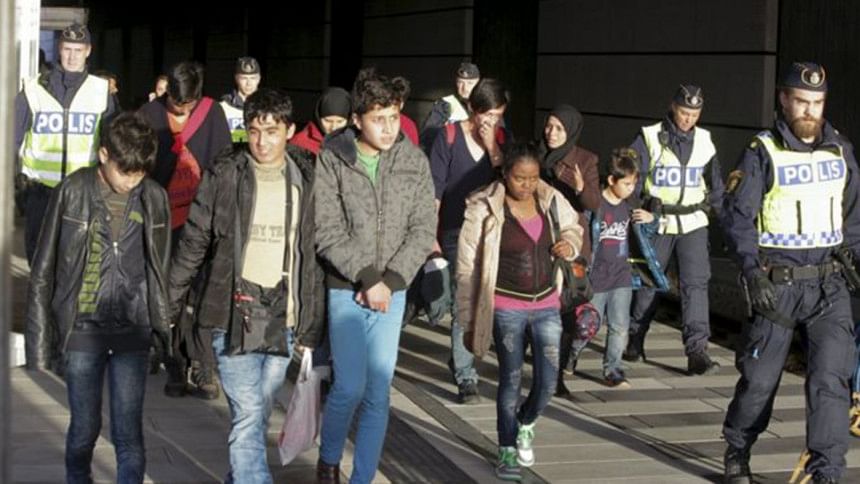Sweden 'to expel up to 80,000 migrants'

Sweden expects to expel up to 80,000 asylum-seekers whose applications have been rejected, its interior minister was quoted as saying.
Anders Ygeman said that charter aircraft would be used to deport the migrants over several years.
"We are talking about 60,000 people but the number could climb to 80,000," Swedish media quoted him as saying.
Some 163,000 migrants applied for asylum in Sweden in 2015, the highest per capita number in Europe.
Of the approximately 58,800 cases processed last year, 55% were accepted.
Earlier on Wednesday, Greece's government responded to allegations in a draft European Commission report that it had "seriously neglected" its obligations to control the external frontier of Europe's passport-free Schengen zone.
Greek government spokeswoman Olga Gerovasili accused the Commission of "blame games" and said it had failed to act on a programme agreed last year to relocate tens of thousands of migrants and refugees stranded in Greece.
Europe is struggling to deal with a crisis that has seen tens of thousands more migrants arrive on Greek beaches, undeterred by cold wintry conditions.
The UN says more than 46,000 people have arrived in Greece so far this year, with more than 170 people killed making the dangerous crossing.
Ygeman was quoted as giving the figure of 80,000 by Swedish Public TV andDagens Industri business newspaper (in Swedish).
He later tweeted to say he had not taken a position on how many migrants had grounds for asylum, it being a matter for the authorities and the courts.
Sweden recently introduced temporary border checks in a bid to control the influx of people. Along with Germany, the Scandinavian country is is a prime destination for refugees and other migrants entering the EU illegally.
Where Europe is failing on migrants?
-The 28 member states have not agreed on an EU-wide mechanism for relocating migrants, meant to ease the burden on Greece and Italy. Only small groups have been relocated so far - and several states in Central and Eastern Europe refuse to accept migrants
-The Schengen agreement on freedom of movement is in jeopardy - Hungary fenced off its borders with Serbia, Croatia and Slovenia; meanwhile Germany, Austria, Denmark, Sweden, Norway and France also reimposed border controls
-The Dublin regulation, under which refugees are required to claim asylum in the member state in which they first arrive, is not working effectively. Countries are no longer sending back migrants to their first point of entry to the EU
-Thousands of migrants - many of them Syrian war refugees - still arrive daily from Turkey
-Processing of asylum applications is slow and there is a big backlog - so reception centres are overcrowded
-Germany - the main destination for migrants - is rethinking its open-door policy, partly because of outrage over assaults on women in Cologne at New Year
Sweden earlier this week became the latest of a number of European nations to see tensions over migrants heightened by violence. A 15-year-old asylum seeker was arrested in Molndal, near Gothenburg, after a 22-year-old asylum centre employee was stabbed to death.
Migration officials say 35,400 unaccompanied minors sought asylum in Sweden in 2015, five times the number in 2014.
In neighbouring Denmark, meanwhile, the government this week approved legislation to seize the valuables of refugees in the hope of limiting the influx of migrants.
Some have likened the Danish proposals to the confiscation of gold and other valuables from Jews by the Nazis during the Holocaust.

 For all latest news, follow The Daily Star's Google News channel.
For all latest news, follow The Daily Star's Google News channel. 








Comments